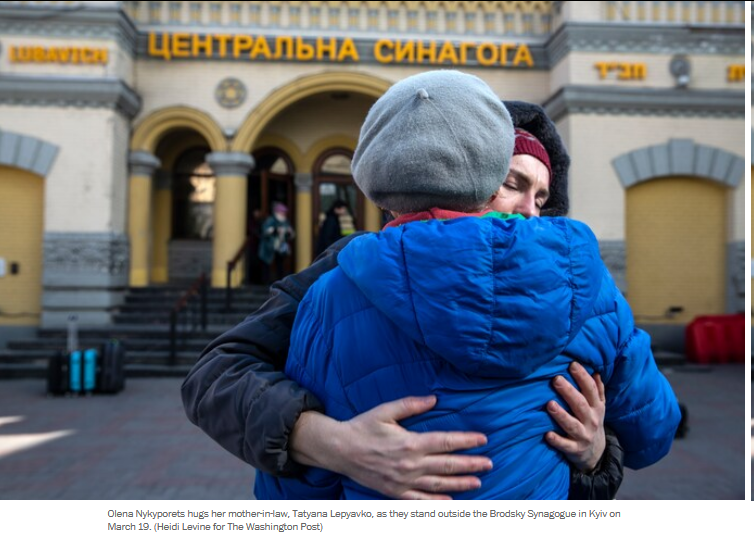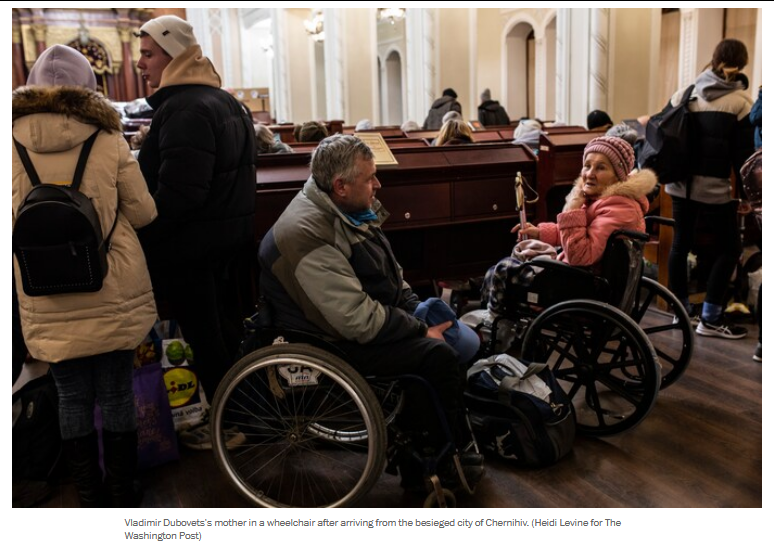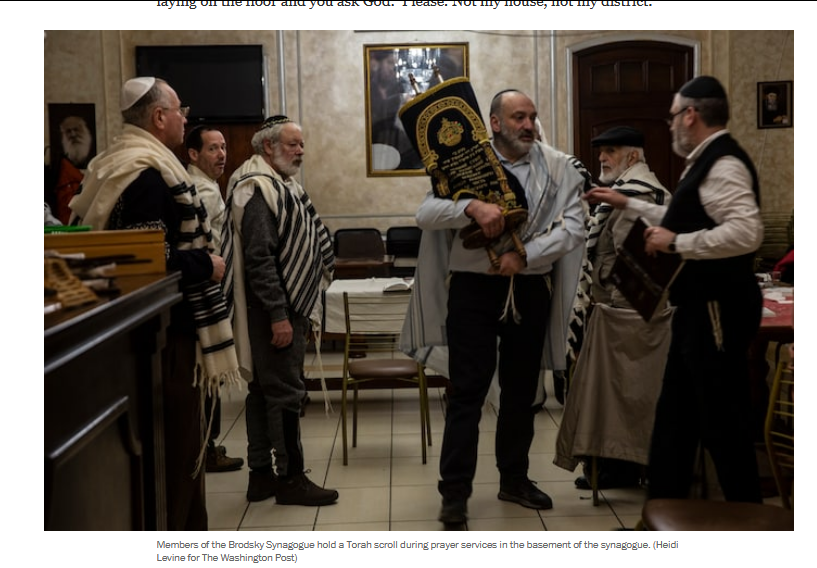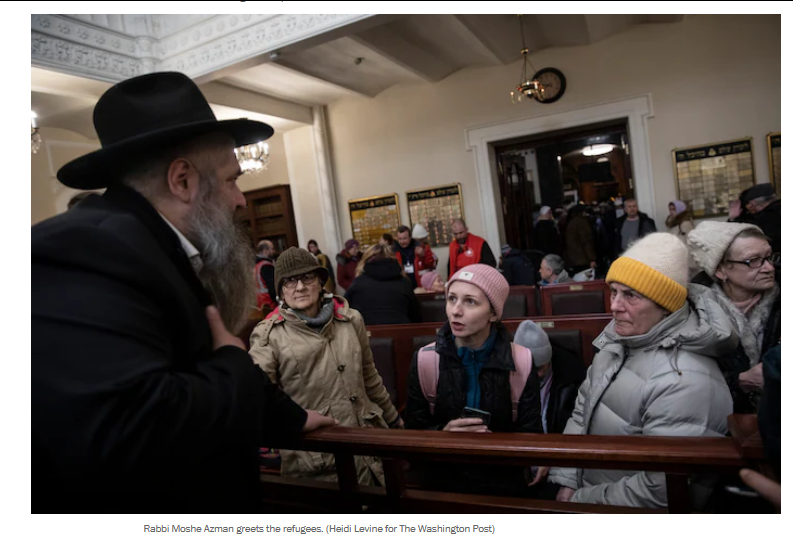
KYIV, Ukraine — A fleet of white vans pulled up to central Kyiv in darkness just after 9 p.m.
The passengers stepped out bleary-eyed, clutching their luggage, pets and young children. They had survived the last two weeks in catastrophic conditions in the besieged city of Chernihiv — then endured an hours-long journey on dangerous roads to the capital.
Now, at the historic Brodsky Synagogue, they had finally reached safety.
The curfew and sabbath were well underway, but at the door to greet the hundreds of civilians pouring out of the convoy was the bearded jovial man who helped arrange their journey: Rabbi Moshe Azman.
“Some said they didn’t eat for three days,” Azman said.
The evacuees from Chernihiv, many of whom had lived underground to avoid an aggressive Russian shelling and bombing campaign, are among the tens of thousands of people Azman said he has helped to move from dangerous areas in the past month. On Friday night, they shuffled through the synagogue, passing by a large silver menorah before settling in the prayer hall, where they rested and warmed up before being relocated to the train station or nearby hotels for the night.
Azman is financing these lifesaving treks for civilians mainly through donations to the synagogue, which he uses to procure buses and pay drivers to deliver them out of the country’s front-line areas, including the devastated southern city of Mariupol. On Saturday at the synagogue, many people who evacuated from Chernihiv, about 90 miles north of Kyiv, boarded buses that took them over the border to Moldova.
Azman estimated that the effort has cost an average of about $100,000 a day since the war began, with a single bus costing upward of $20,000 because of current shortages. In all, he said, the humanitarian effort has cost nearly $2 million. Ukraine’s Jewish community has long faced violent discrimination — including pogroms and the horrors of the Holocaust — that prompted many Jewish Ukrainians to emigrate out of the country.
Azman had a brief moment in the international spotlight during President Donald Trump’s first impeachment drama. Igor Fruman, an associate of former New York mayor Rudolph Giuliani, knew Azman from the Brodsky Synagogue and raised money for Anatevka, the village in Ukraine linked to Azman that was established to house Jewish refugees fleeing the war in the country’s east. At one point in 2019, Giuliani traveled to Europe, met Azman and became an “honorary mayor” of the town.
The village was among the first to be evacuated in recent weeks. Now, the rabbi said, he is relishing the chance to help Ukrainians of all faiths find safety.
“Helping people is like a narcotic for me,” he said.
After decades of building their lives in Ukraine, Jews are once again fleeing the country
On Saturday morning, Vladimir Dubovets sat on the synagogue steps, visibly shaken, his elderly mother in a wheelchair nearby. They were among the civilians Azman’s convoy had helped rescue the night before.
Dubovets is 40. But after the last week in Chernihiv, he said, “I feel like 80.”

He had no power, heat or phone connection for eight days. His elderly mother, who cannot walk, had to hide in their hallway. The temperature inside their apartment hovered just above freezing.
When he ventured outside as an informal volunteer for the Red Cross, he said he saw corpses on the street. People he met were “wounded and suffering,” he said. Around a week ago, a missile struck a house in front of his eyes. When shelling began to hit buildings in his neighborhood and his building was damaged, he carried his mom down four flights of stairs and moved to a friend’s apartment before joining the bus convoy to to Kyiv.
The communication difficulties have contributed to a lack of widespread understanding of the dire conditions inside the city. If he could, Dubovets said, he would pull foreign leaders “out from their warm beds and put them in our position.”
The only way any outsider could understand, he said, is if they heard the planes “bomb the city.”
“These explosions, this trembling of the house,” he said. “And you are just laying on the floor and you ask God: ‘Please. Not my house, not my district.’ ”


What he witnessed left him convinced, he said, that Russian soldiers are “zombies. They are not people.”
Daria Kudra, 42, who traveled with her two children, said she witnessed an airstrike damage a school that was being used as a shelter. “Some kids were wounded,” she said. “I saw people taking kids out from the shelter.”
Anna Vemmenya, 41, who works in a kindergarten, traveled to Kyiv in the convoy with her children, Adrian, 14, and Daria, 11, along with their two cats and two dogs. When they finally saw the lights of Kyiv on Friday night, she said, “it was like a miracle. We had not seen light in many, many days.”
Before reaching Kyiv, they had spent 11 days underground, leaving only to move to a new shelter and to try to find medicine for her daughter, who came down with a fever. While walking to the pharmacy, she said, a war plane flew directly over her head.
“There are no drugs, no food, no electricity, no communication, nothing,” she said. “It was like we are living in the Middle Ages except they’re also bombing.”
For nine days in a shelter under a telecommunications building, 148 adults and 26 children shared a single toilet, she said. They fed their pets bread and porridge and shivered from the cold. Then a volunteer offered a way out: the convoy organized by Azman and his colleagues. They jumped at the chance, fearing that if they stayed behind, they might not make it out alive.
“They’re bombing the whole day and whole night,” she said. “They target mostly civilians, especially civilian buildings. It is impossible to preview.”
Igor Poschenko, 27, fled with a group of relatives. Several days ago, he said, he was trying to reach a shelter when he was nearly struck by a missile that targeted a civilian home. “I’m really lucky to be alive,” he said. Even tasks like buying water or food became a nightmare. What he witnessed left him certain that Russians are directly targeting civilians, he said.
“These idiots kill people who are trying to buy food,” he said. “If you’re lucky, you’ll survive. If not, instant death.”
“It’s not just tales people create to blame Russians,” he added. “It’s madness.”
Downstairs at the synagogue, Rachel Strugatskaya, 46, was helping cook for the many people who are seeking shelter and help from the Jewish community. Each day, she said, she cooks for as many as 500 people.
For the past week, she and her family have slept in the synagogue on the floor of a basement dining area. Staying there has helped her connect to her faith during a time of crisis, she said.

Her decision to help is in part personal. She was born in Chernihiv but lives in Kyiv. When buses of evacuees began to arrive from her hometown, “I saw a lot of people I recognized,” she said. “People come here in bad condition.”
Her father was among them. For days, he had no electricity or water and slept in a closet to stay safe. “He didn’t want to leave, but he agreed because it’s become impossible to live there,” she said.
Latest updates from the Ukraine war
Built in 1898, the synagogue has changed hands many times — including periods when it was used as a Soviet workers’ club, occupied by the Nazis, and was later transformed into a puppet theater, Azman said.
Now it is offering safe haven to people fleeing the horrors of a conflict Azman said reminds him of World War II. Putin has promised to “de-Nazify Ukraine” — but the rabbi said the only forces Ukrainians need saving from are the Russians themselves.
“I don’t believe what I see with my own eyes … I pinch myself like it’s a dream,” he said. “I feel an obligation to save every life.”
Paul Sonne in Washington and Olha Bekshmelnytsina and Kostiantyn Tatarchuk in Kyiv contributed to this report.
War in Ukraine: What you need to know
The latest: President Biden confirmed Monday that Russia has used hypersonic missiles, which travel faster than five times the speed of sound, in Ukraine. Frustrated with its lack of gains on the ground, the Kremlin could also seek to escalate the war by using biological and chemical weapons, Biden said.
The fight: Russia — which has launched more than 1,000 missiles so far — is increasingly relying on “dumb” bombs to wear cities and civilians down. Russia’s assault on Ukraine has been extensive with strikes and attacks across the entire country, and Russia has been accused of committing war crimes.
The weapons: Ukraine is making use weapons like Javelin antitank missiles and Switchblade “kamikaze” drones from the United States and other allies to combat the superior numbers and heavier weaponry of the Russian military.
Oil prices: Sanctions on Russia are helping gas prices hit new highs. Here’s why — and how long the surge could last.
In Russia: Putin has locked down the flow of information within Russia, where the war isn’t even being called a war. “Information warriors” from around the world are working to penetrate Putin’s propaganda wall.
How you can help: Here are ways those in the U.S. can help support the Ukrainian people as well as what people around the world have been donating.
Read our full coverage of the Russia-Ukraine crisis. Are you on Telegram? Subscribe to our channel for updates and exclusive video.Show more




